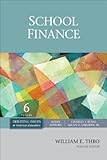School finance / volume editor, William E. Thro.
Material type: TextPublication details: Los Angeles : Sage Reference, c2012.Description: xxvii, 404 p. 24 cmISBN:
TextPublication details: Los Angeles : Sage Reference, c2012.Description: xxvii, 404 p. 24 cmISBN: - 9781412987578
- LB 2825 .Sch65 2012 v.6
| Item type | Current library | Call number | Status | Date due | Barcode | |
|---|---|---|---|---|---|---|
 Reference
Reference
|
Aklatang Emilio Aguinaldo-Information Resource Center Reference | LB 2825 .Sch65 2012 v.6 (Browse shelf(Opens below)) | Not for loan | 3AEA2014000754 |
A Sage reference publication.
Includes bibliographical references and index.
Should local school districts be able to impose additional tases to provide additional educational resources? -- Should states limit the indebtedness of local school districts? -- Should the leadership of each individual school ahve the authority to determine how money is spent at that school? -- Should states rely on local property taxes as a primary method of financing public schools? -- Should the federal government condition federal funds for school districts on the implementation of federally mandated curricula? -- Should the federal government pay all the costs of special education services? -- When individual states require local school districts to provide gifted education, should the state pay all the costs? -- Should schools base teacher salaries on student performance? -- Should state courts adjudicate challenges to public schools' financing systems? -- Do state constitutional provisions concerning education establish a judicially enforceable standard? -- Should the courts ensure that student expenditures are substantially equal (the equity theory of school finance litigation)? -- Should the courts ensure that every school district has sufficient funds to provide a quality education (the adequacy theory of school finance litigation)? -- Should students pay additional fees to participate in extracurricular activities such as athletics or band? -- Should school districts charge additional fees for academic programs such as advanced placement classes? -- Should the state give vouchers to poor students to allow them to attend private schools? -- Should the state give tax credits to parents who pay for their children to attend private schools? -- Should the state create and fund charter schools that are not subject to the same standards and requirements as traditional schools? -- Should students be required to engage in fund-raising activities as a condition of participating in certain activities or events?
Provides views on multiple sides of curriculum and instruction issues in America's schools and offers more in-depth resources for further exploration. This volume examines school finance, covering such varied issues as additional fees, charger schools, equity vs. adequacy, federal mandates and funding, merit pay for teachers, property taxes and local revenues.
There are no comments on this title.











